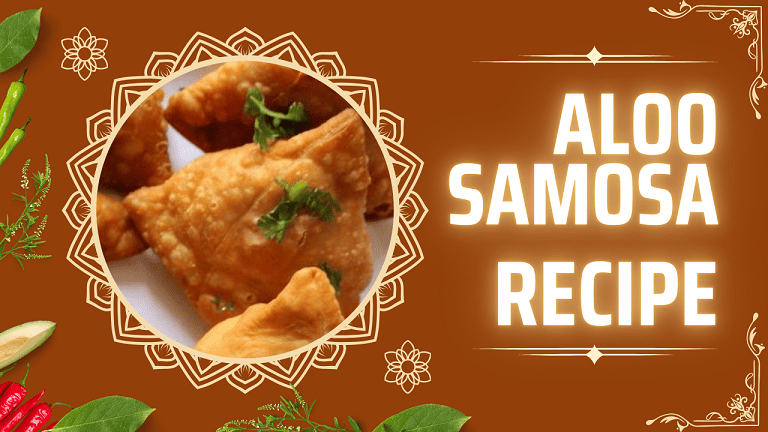Aloo Samosa Recipe
Aloo Samosas are a beloved snack in Indian cuisine, known for their crisp, flaky exterior and savory potato filling. This traditional dish has a rich cultural significance, often served at festive occasions, family gatherings, or as a delightful street food snack.
Samosas are not only delicious but also provide a nutritious option for vegetarians, making them a staple in many Indian households.
The primary ingredient in Aloo Samosas is the humble potato, which is packed with carbohydrates, providing energy, along with essential vitamins and minerals. The spices used in the filling add flavor and health benefits, making these snacks more than just a treat.
Using fresh, locally sourced ingredients enhances the flavor and nutrition of the samosas, allowing you to create a dish that is both wholesome and satisfying.
Health Benefits of Aloo Samosas
Potato Nutrients: Potatoes are rich in vitamins C and B6, potassium, and dietary fiber, which aid digestion and overall health.
Spices for Health: The spices used in the filling, such as cumin and coriander, have anti-inflammatory properties and can help with digestion.
Customizable Filling: Aloo Samosas can be filled with various ingredients, allowing for added nutrition through vegetables, lentils, or other healthy options.
Balanced Snack: When paired with chutneys or yogurt, Aloo Samosas can provide a balanced snack, incorporating proteins and healthy fats.
Ingredients for Aloo Samosas
For the Dough:
- All-purpose flour (maida) – 2 cups
- Semolina (rava) – 2 tablespoons (for extra crispiness)
- Carom seeds (ajwain) – ½ teaspoon (for flavor and digestion)
- Salt – 1 teaspoon
- Oil – 2 tablespoons (for dough)
- Water – as needed to knead the dough
For the Filling:
- Potatoes – 4 medium-sized, boiled and mashed (about 500 grams)
- Onion – 1 medium-sized, finely chopped
- Green peas – ½ cup (optional)
- Ginger – 1 inch, grated
- Green chilies – 1-2, finely chopped (adjust according to spice preference)
- Coriander powder – 1 teaspoon
- Cumin powder – ½ teaspoon
- Garam masala – ½ teaspoon
- Turmeric powder – ¼ teaspoon
- Red chili powder – ½ teaspoon (optional)
- Fresh coriander leaves – 2 tablespoons, finely chopped
- Lemon juice – 1 tablespoon
- Salt – to taste
- Oil – for frying
Step-by-Step Instructions
Prepare the Dough:
Mix the Dry Ingredients: In a large mixing bowl, combine the all-purpose flour, semolina, carom seeds, and salt. Mix well to ensure even distribution.
Incorporate Oil: Add the oil to the dry ingredients and rub it in with your fingers until the mixture resembles breadcrumbs.
Knead the Dough: Gradually add water and knead to form a smooth, firm dough. Cover it with a damp cloth and let it rest for 30 minutes. This resting period is essential for gluten development, which contributes to the flakiness of the samosas.
Prepare the Filling:
Cook the Ingredients: In a pan, heat a tablespoon of oil. Add the finely chopped onions and sauté until they become translucent.
Add Spices and Vegetables: Stir in the grated ginger, chopped green chilies, and optional green peas. Cook for a couple of minutes. Then add the boiled and mashed potatoes, coriander powder, cumin powder, garam masala, turmeric powder, red chili powder, and salt. Mix well to combine all the flavors.
Finish the Filling: Remove the mixture from heat and add fresh coriander leaves and lemon juice. Allow the filling to cool before using it to fill the samosas.
Shape the Samosas:
Divide the Dough: After the dough has rested, knead it briefly and divide it into equal portions, about the size of a golf ball.
Roll the Dough: Take one portion of the dough and roll it out into a circle of about 6 inches in diameter. Cut the circle in half to form two semi-circles.
Form the Cone: Take one semi-circle and form a cone by folding it over, sealing the edge with a little water. Pinch the bottom edge to ensure it’s closed.
Fill the Cone: Stuff the cone with about a tablespoon of the potato filling. Ensure you do not overfill, as this may cause the samosa to burst during frying.
Seal the Samosa: Wet the edges of the open side of the cone and fold it down to seal it completely. Press the edges together firmly to ensure they are well sealed.
Fry the Samosas:
Heat the Oil: In a deep pan or kadhai, heat enough oil for deep frying over medium heat. To check if the oil is hot enough, drop a small piece of dough into the oil; it should sizzle and rise to the surface.
Fry the Samosas: Carefully slide in a few samosas at a time, ensuring not to overcrowd the pan. Fry them until they turn golden brown and crisp, about 5-7 minutes.
Drain Excess Oil: Once fried, use a slotted spoon to remove the samosas and place them on a plate lined with paper towels to absorb excess oil.
Tips for Maximizing Flavor and Nutrition
Fresh Ingredients: Always use fresh, seasonal ingredients for the best flavor. Visiting local markets can help you find the freshest produce.
Spice to Taste: Adjust the spices based on personal preferences. If you prefer milder samosas, reduce the number of green chilies or skip the red chili powder.
Mix and Match: Feel free to add other vegetables like grated carrots or finely chopped bell peppers to the filling for added nutrition and flavor.
Pre-cooking Potatoes: Ensure the potatoes are well boiled but not overcooked. This helps achieve a smooth texture without water content that could make the filling soggy.
Chill Before Frying: If you have time, refrigerate the shaped samosas for 15-20 minutes before frying. This helps them hold their shape better during cooking.
Variations and Substitutions
Baked Samosas: For a healthier alternative, consider baking the samosas instead of frying. Preheat the oven to 200°C (400°F), brush the samosas lightly with oil, and bake for about 25-30 minutes or until golden brown.
Different Flours: Substitute all-purpose flour with whole wheat flour (atta) for a healthier option. This change will also add a nuttier flavor.
Different Fillings: Instead of potatoes, try using a filling of lentils or paneer. Spiced mashed paneer with herbs can make a delicious variation.
Add Nuts: For an extra crunch, consider adding finely chopped nuts such as cashews or almonds to the potato filling.
Vegan Option: If you’re looking for a vegan alternative, replace the potato filling with mashed tofu and mix it with vegetables and spices for a protein-packed option.
Serving Suggestions
Chutney Pairing: Aloo Samosas are best served hot with a variety of chutneys, such as mint chutney, tamarind chutney, or yogurt sauce, enhancing their flavor.
Presentation on a Platter: Arrange the samosas on a large serving platter, garnished with fresh coriander leaves, lemon wedges, and your choice of chutneys for a colorful and inviting display.
Snack or Meal: Serve them as a snack or appetizer during gatherings, or incorporate them into a larger meal alongside rice or flatbreads for a filling option.
Accompaniments: Pair with a side of salad made from fresh vegetables like cucumbers, onions, and tomatoes drizzled with lemon juice for a refreshing contrast.
Make it a Meal: To turn samosas into a meal, consider serving them alongside a lentil dish, rice, or a curry, creating a well-rounded vegetarian feast.
Presentation Tips
Use Colorful Dishes: Serve the samosas on colorful, traditional Indian platters to enhance their appeal.
Garnish Elegantly: Garnish with fresh herbs or a sprinkle of chaat masala for a vibrant touch.
Dip Display: Place small bowls of chutneys around the platter for easy access and a visually appealing arrangement.
Layering Heights: Stack samosas in a tiered arrangement on the serving plate for an eye-catching presentation.
Conclusion
Aloo Samosas are a timeless classic in Indian cuisine, offering a delightful combination of flavors and textures. With their crisp exterior and flavorful potato filling, they are perfect for any occasion, from festive celebrations to casual snacking.
The use of fresh, locally sourced ingredients not only elevates the taste but also ensures that you are making a nutritious dish.
By following this recipe, you can create your own batch of delicious Aloo Samosas that will impress family and friends. Remember to experiment with variations and substitutions to suit your dietary preferences and ingredient availability.
This flexibility is one of the joys of cooking, allowing you to make the dish your own while still enjoying the rich flavors and textures that define Aloo Samosas.
Embracing the Culinary Journey
Cooking is an art, and preparing Aloo Samosas provides an opportunity to explore the diverse and vibrant culinary landscape of India. Each bite of these golden, crispy treats is not just about flavor but also a connection to cultural traditions and communal gatherings.
As you make your samosas, consider the memories and experiences you can share with others. The kitchen is a wonderful space for creating not just food, but also moments of joy and connection.
Final Thoughts
Aloo Samosas are more than just a snack; they are a symbol of hospitality and warmth in Indian culture. Whether enjoyed at a bustling street stall or homemade in a family kitchen, they are loved for their delicious taste and satisfying crunch.
So roll up your sleeves, gather your fresh ingredients, and dive into the delightful world of making Aloo Samosas. With each step, you will not only hone your cooking skills but also create something special that can be shared and enjoyed with others.
Now, armed with this recipe and tips, you’re ready to make Aloo Samosas that will delight your taste buds and nourish your body. Happy cooking!
Thanks for visiting Veg Recipe

